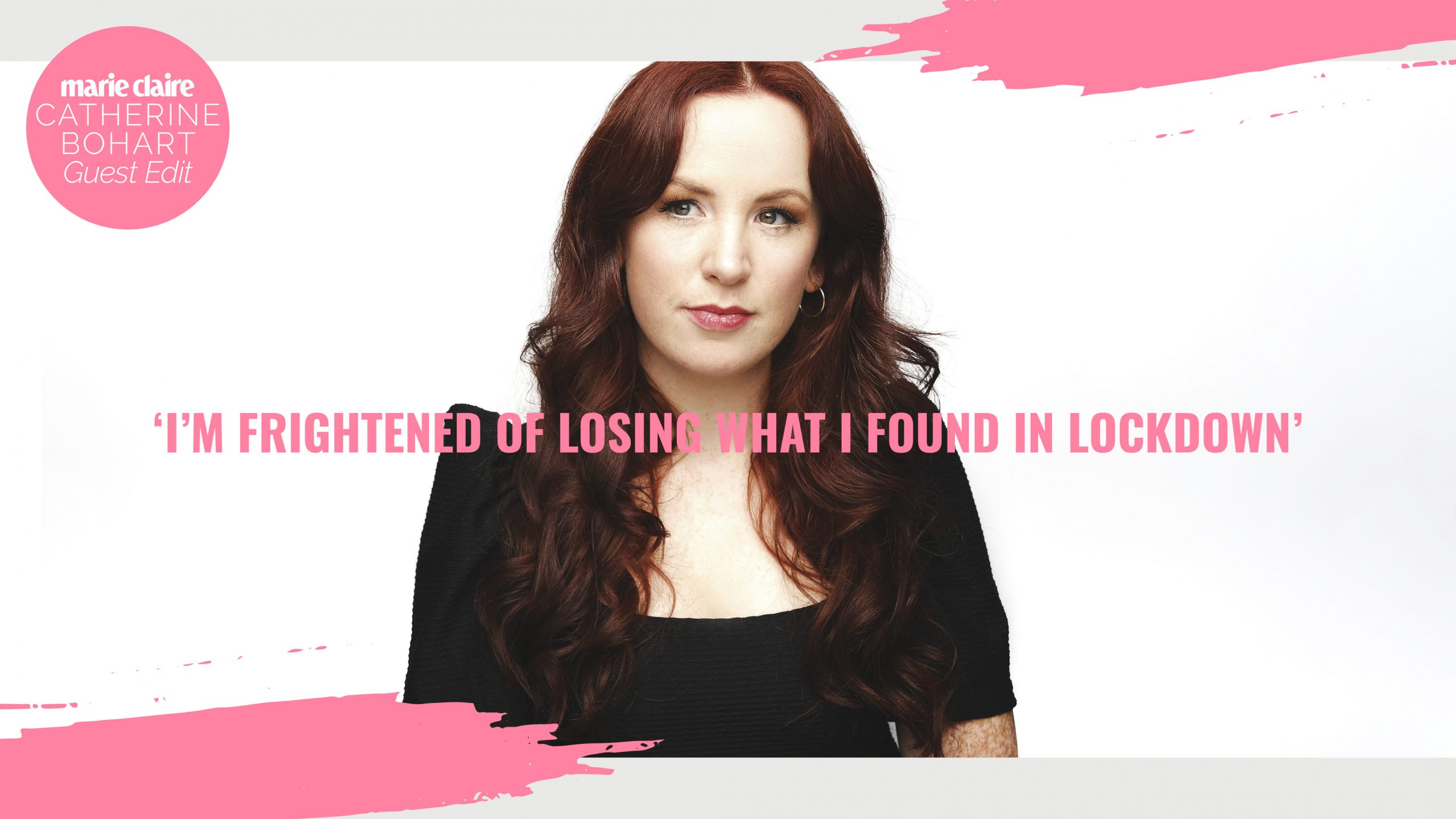A psychologist shares 11 key ways to protect your kids mental health this lockdown
It's Children's Mental Health Week and never has Dr Emma Hepburn's (aka @thepsychologymum) top tips for safeguarding their mental wellbeing been so important

It's Children's Mental Health Week and never has Dr Emma Hepburn's (aka @thepsychologymum) top tips for safeguarding their mental wellbeing been so important
There's been a whole host of support offered to adults during the Coronavirus pandemic. When the crisis hit the UK last March, government ministers were quick to set up monetary support for the permanently and self-employed. Their schemes aimed to help anyone who was suddenly or unexpectedly out of work.
Here at Marie Claire we've run guides to burnout, managing COVID-induced money worries and coping with redundancy. We penned a round-up of the best mental health apps for adults feeling depressed, stressed, anxious or fatigued, alongside a whole ream of health and fitness content (hey, home workouts) aimed at making sure you're staying in top physical shape from home, too.
But what about the children? We're all too quick to forget that, for youngsters, it's been a rough ride, too. Many children (and parents) were forced into home-schooling again when schools shut earlier this month. Sadly, working-class students were hit hardest when it came to A Level results, thanks to a questionable algorithm that decided the grades. And yet, the true extent of just how much learning has been stinted by a year of sporadic online teaching is yet to come to the fore.
It's important to acknowledge the confusion your child may be feeling, according to Dr Emma Hepburn (@thepsychologymum), a clinical psychologist and author of A Toolkit for Modern Life; 53 Ways to Look After Your Mind (£17.99, amazon.co.uk). "Some early research by Oxford University suggests that parents with kids between the ages of 4 and 10 years of age saw an increase in their child’s emotional difficulties during lockdown," she shares.
Like? The report details children felt more unhappy and worried, with tell-tale behaviours including increased clinginess and physical symptoms associated with worry, like tummy aches, headaches, bedwetting, disturbed sleep, and nightmares.
"The government's recent State of the Nation report indicated that mental health difficulties have increased for some school-aged children over the course of the pandemic," Emma continues. However, she stresses it's not all gloom and doom. "Many children and families are extremely resilient in the face of challenges. The report highlighted that despite what a difficult year it's been, many children proved resilient."
Marie Claire Newsletter
Celebrity news, beauty, fashion advice, and fascinating features, delivered straight to your inbox!
Read on for safeguarding advice - and don't miss our favourite ways to keep your kids active while home-schooling, while you're here.
11 mental health tools: a psychologist's top tips for protecting your kid
1. Normalise your child’s feelings
If your child is feeling anxious, worried, stressed or angry, make sure you communicate to them that this is okay. Explaining that it's only normal to have ups and downs will help them to understand their changing emotions as a part of life, Emma explains.
"Let them know that everybody feels worried or bad at times, even their favourite TV character or singer. Putting it into their terms and explaining that it's a completely normal feeling, that everyone experiences from time to time, is important," she explains.
2. Validate their experience and feelings
Similar to the above, but slightly different. "It’s very easy to fall into saying reassuring statements like “there’s nothing to be scared of”," Emma explains. However, she stresses that these statements can minimise feelings. "They don’t encourage open conversation about how children actually feel. Instead, try acknowledge and validate their emotion—that way, they'll feel heard and supported."
She suggests using validating statements such as:
- It sounds like you are a bit worried about ... (subject matter)
- Lots of people feel worried about these types of things
- It’s okay to feel this way
- We can speak about these and find ways to work them out.
3. Ensure you don’t minimise their feelings
This can be tricky when you're tired and find yourself relying on bad habits, but it is important. "You can easily slip into invalidating statements such as “don’t be a baby” or “don’t be silly”," Emma shares. "Try and be mindful of the language you are using around emotions, when possible, to ensure you are not minimising any of their emotions," she continues.
4. Find ways for you to manage their emotions
Did you know? Children normally show emotion through their behaviour. "Your brains are designed to pick up on emotions, so when our child's emotions rise, your emotions often rise in tandem," Emma describes. Ever wondered why it's so hard to stay calm or not shout back? For this exact reason.
"Find ways to help you calm down so you can respond helpfully and calmly to their emotions or outbursts," she prompts. "This might be slow breathing, taking a few minutes before you respond, or only using genuinely helpful statements."
Why? Well, you'll likely know that responding when stressed or emotional (hello, shouting) normally only heightens the tension and prolongs the drama. "Children are taught from behaviours and learn how to deal with their own emotions from how people around them respond to theirs. Try to make sure you are feeling calm before you respond to your children’s emotions, when you can," Emma concludes.
5. Plan feel-good activities
It's all too easy to get wrapped up in the best way to chat, discipline and raise your kids, but sometimes, the best remedy for both your and their stress is just to have some fun together, Emma explains. "Speak to your children about what they enjoy doing, and what makes them feel good," she shares.
She suggests planning some simple fun activities based around their suggestion for during their home-schooling. That way, children have something to look forward to. Plus, building on things your children enjoy will only encouraging your their interests, she adds. Stuck for ideas? Read our guide to the most fun kids home-schooling activities, now.
6. Spend time with them
As per the previous point, sometimes the simplest approaches are the most powerful.
Notice your child acting a little down? "Try to allocate some individual time playing or doing activities with your children," Emma suggests. "If they're chosen by your children, even better. This helps children feel safe and secure. It's often at these times you will pick up on worries or they will start to actually open up to you about what's on their mind."
7. Focus on children and family strengths
Think about this one: when someone reminds you of your strengths, it makes you feel good. Right? The same applies to kids.
"Remind them about all the things you have managed or achieved as a family," Emma suggests. "Tell them how proud you are of them and how well they have managed during the lockdown. Letting them know that, as a family, you will work together and manage any future changes and challenges is important and reassuring", she adds.
8. Praise their efforts
Again, something that works for adults and children alike. Everyone loves a compliment.
"Focus on what they have done well and praise them when they manage difficult challenges. It's also worth giving them a 'well done' when they do open up and speak to you about how they are feeling. It makes it more likely for them to repeat the behaviour", the psychologist shares.
N.B. here: focusing on the effort rather than achievement is thought to be the most helpful form of praise, according to Emma.
9. Re-establish routines
Home-schooling doesn't need to be chaotic, but equally, it’s okay if routines have slipped, Emma says. Just make sure you've vaguely got the kids back into a routine before they go back to school, she suggests.
"By re-establishing these prior to school going back, you can minimise the number of changes happening at one time and create a settling routine prior to school", she says. Crisis averted.
10. Help develop coping strategies to regulate their emotions
You know like you use the Calm app and do your home workouts? Kids need coping strategies, too. "Practise calming activities and relaxation at home and try and make them as fun as possible. Think yoga, stretching and breathing. Relaxation activities can also be a helpful part of any bedtime routine", Emma explains.
Not sure where to look? She reckons there are lots of good ideas on mentallyhealthyschools.org.uk and recommends the Cosmic Kids Yoga channel on YouTube, where there are lots of fun and easy to follow yoga and relaxation videos for children.
11. Look after yourself
This one is important. "Being kind and compassionate to yourself and looking after your own needs is essential for any parent. Make sure to talk through your own worries with people you trust. This is also probably a stressful time for you, so ensure you look after your own wellbeing as much as you can. This is essential for you to be able to help your child", she concludes.

Ally Head is Marie Claire UK's Senior Health and Sustainability Editor, nine-time marathoner, and Boston Qualifying runner. Day-to-day, she heads up all strategy for her pillars, working across commissioning, features, and e-commerce, reporting on the latest health updates, writing the must-read wellness content, and rounding up the genuinely sustainable and squat-proof gym leggings worth *adding to basket*. She also spearheads the brand's annual Women in Sport covers, interviewing and shooting the likes of Mary Earps, Millie Bright, Daryll Neita, and Lavaia Nielsen. She's won a BSME for her sustainability work, regularly hosts panels and presents for events like the Sustainability Awards, and is a stickler for a strong stat, too, seeing over nine million total impressions on the January 2023 Wellness Issue she oversaw. Follow Ally on Instagram for more or get in touch.
-
 Style Briefing: Matthieu Blazy's last hurrah
Style Briefing: Matthieu Blazy's last hurrahHow the designer delivered a fresh perspective while also honouring its history of craft and creativity
By Rebecca Jane Hill
-
 The Emily in Paris cast has spoken out as one of its stars officially quits the show
The Emily in Paris cast has spoken out as one of its stars officially quits the showBy Jenny Proudfoot
-
 Timothée Chalamet’s mother has opened up about his relationship with Kylie Jenner
Timothée Chalamet’s mother has opened up about his relationship with Kylie JennerBy Jenny Proudfoot
-
 "I'm a Black barrister working in a broken justice system"
"I'm a Black barrister working in a broken justice system"Alexandra Wilson is a 26-year-old barrister speaking out about sexism, racism and class inequality at the very heart of the legal system. She shares her disturbing experiences, and why activism will make a difference.
By Alexandra Wilson
-
 Feeling sad this week? Learn about the 5 steps of grief, plus how to avoid it consuming you
Feeling sad this week? Learn about the 5 steps of grief, plus how to avoid it consuming youAs the nation mourns Her Majesty The Queen.
By Ally Head
-
 Pride events: 7 IRL and virtual celebrations to add to your calendar for 2021
Pride events: 7 IRL and virtual celebrations to add to your calendar for 2021Ready to celebrate?
By Rosie Grant
-
 Coronavirus versus cold symptoms: How to know whether you've got COVID 19 or a common cold
Coronavirus versus cold symptoms: How to know whether you've got COVID 19 or a common coldThis is important. Read guidance from the experts now.
By Ally Head
-
 How COVID-19 made us forget our morals on plastic
How COVID-19 made us forget our morals on plasticPre-pandemic, we cared about our habits of plastic use. Lockdown changed all that - but it's not too late to continue the fight
By Olivia Adams
-
 Catherine Mayer on women's rights: 'I see how much is to be done and how urgently'
Catherine Mayer on women's rights: 'I see how much is to be done and how urgently'Co-founder of the Women's Equality Party, Catherine Mayer, was married to influential musician Andy Gill until his death in Feb 2020. This International Women's Day, Mayer shares with affecting honesty how grief adds clarity to her life-affirming activism
By Maria Coole
-
 Tanya Burr shares her top 6 resources for educating yourself - and growing - this IWD
Tanya Burr shares her top 6 resources for educating yourself - and growing - this IWDThe theme of this International Women's Day is Choose to Change - let Tanya help you become a change-maker with her top resources.
By Ally Head
-
 Catherine Bohart: 'I’m frightened of losing what I found in lockdown'
Catherine Bohart: 'I’m frightened of losing what I found in lockdown'Award-winning writer and comedian Catherine Bohart shares what her own lockdown mental health journey helped her discover
By Sophie Goddard